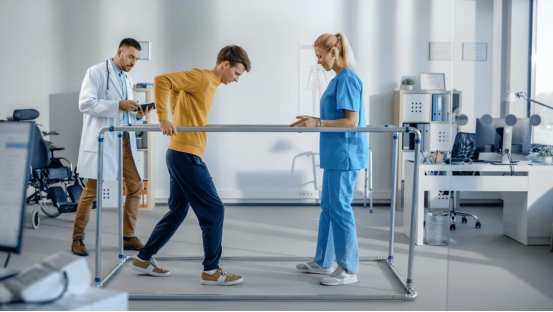Neurological conditions such as stroke, traumatic brain injury (TBI), and multiple sclerosis (MS) present significant challenges to individuals and their families. These conditions can hinder physical abilities and disrupt normal life, emphasizing the need for effective interventions.

Neurological rehabilitation emerges as a crucial method for recovery, aiding individuals in regaining independence and improving their quality of life. Through targeted therapy and support, patients can embark on their journey toward reclaiming a fulfilling life.
The Importance of Neurological Rehabilitation
Neurological rehabilitation focuses on facilitating recovery and management of neurological conditions such as stroke, TBI, and MS. Its core objectives encompass improving physical functionality and addressing psychological well-being, which are both essential for holistic recovery. Research has shown that approximately 50% of stroke patients may regain independence through targeted rehabilitation programs. Moreover, a groundbreaking study published in the Archives of Physical Medicine and Rehabilitation underscored the effectiveness of tailored interventions in enhancing the quality of life for individuals battling neurological disorders, demonstrating the integral connection between comprehensive care and successful rehabilitation outcomes.
Comprehensive Care: Beyond Physical Recovery
Rehabilitation programs play a pivotal role in helping patients recover from neurological events, including strokes, TBI, and MS. These programs are meticulously designed to restore essential physical abilities, with an emphasis on improving mobility, strength, and coordination through customized exercises and physical therapy sessions. A notable technique, the Brunnstrom Approach, leverages natural recovery patterns to enhance motor function effectively.
Additionally, the emotional and psychological dimensions of recovery are addressed within these programs. Supportive measures such as counseling, participation in support groups, and individual therapy tackle the mental health challenges that often accompany the physical recovery process. This holistic approach acknowledges that healing extends beyond just physical capabilities; it intertwines mental health into the rehabilitation journey. By treating patients comprehensively, encompassing both body and mind, effective care fosters faster and more sustainable recovery outcomes.
Innovative Techniques and Therapies
The field of neurological rehabilitation is constantly evolving, with remarkable advancements introducing innovative techniques such as robotics, virtual reality therapy, and neurofeedback to enhance recovery. Robotics, for example, allows for controlled repetitive movement training, which is critical for regaining motor skills lost due to strokes. Virtual reality immerses patients in engaging environments, facilitating cognitive and physical rehabilitation while providing an interactive experience. Neurofeedback allows patients to receive real-time insights into their brain activity, empowering them to modulate their cognitive processes effectively.
Rehabilitation plans are intricately tailored to address each patient's unique requirements, emphasizing a patient-centered care model. Dr. Jane Smith, a specialist in the field, notes, "Each recovery journey is unique; adapting therapies to align with individual goals is vital to achieve the best results." Continuous research is instrumental in refining these methods, focusing on innovative materials and therapeutic techniques to optimize therapeutic outcomes. Ongoing studies are examining the combined efficacy of these technologies to maximize both patient engagement and rehabilitation effectiveness.
Patient Success Stories
"After my stroke, I felt as though I had lost everything," shares Maria, 42, reflecting on her journey through rehabilitation. "Thanks to the dedicated support of my therapist, I regained my independence and my sense of self. This experience truly changed my life." Maria's story exemplifies the profound impact that rehabilitation can have, instilling hope and resilience in countless families confronting similar difficulties.
Taking Your First Step Towards Recovery
Initiating the recovery process is key to unlocking one’s potential. Consider exploring local rehabilitation programs and resources available through websites like the National Rehabilitation Information Center (naric.com) or the Brain Injury Association (biausa.org). Remember, assistance is readily available—embracing the journey toward recovery can lead to a brighter, more promising future.
